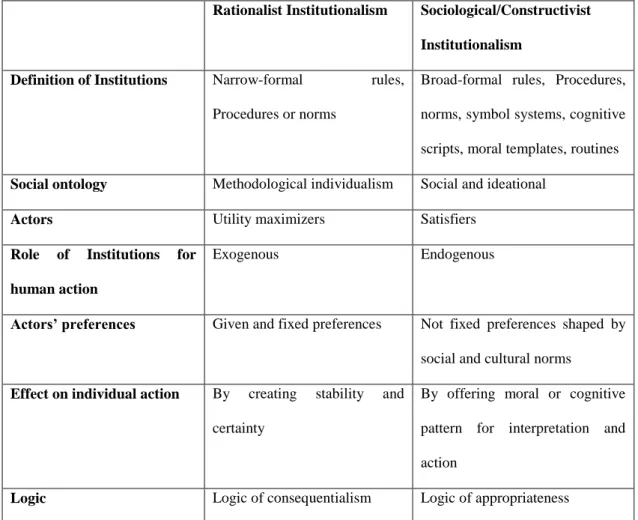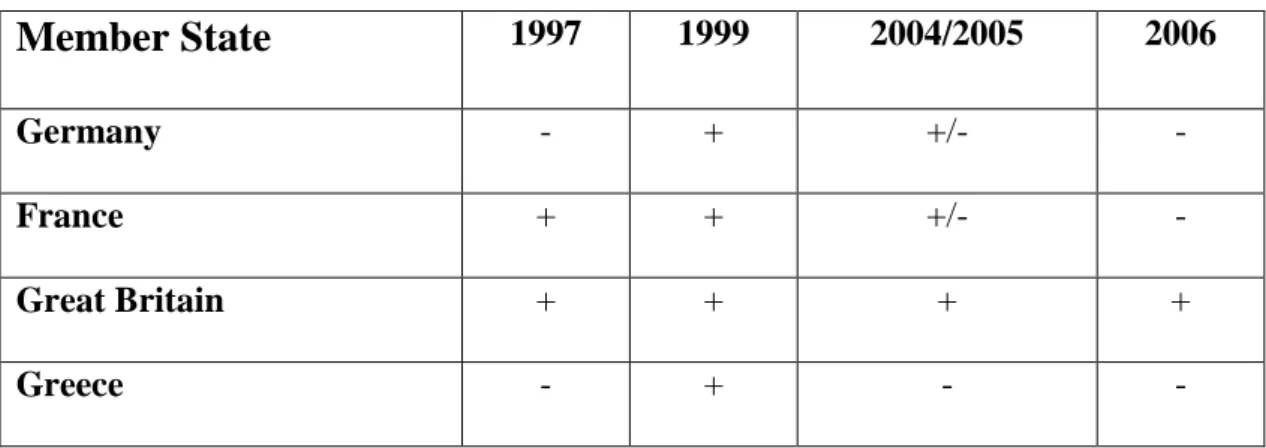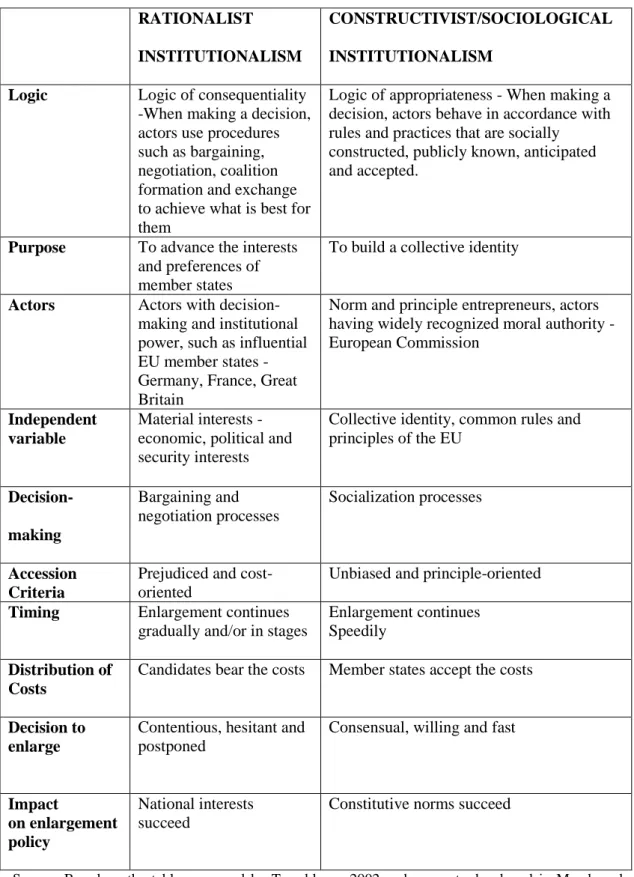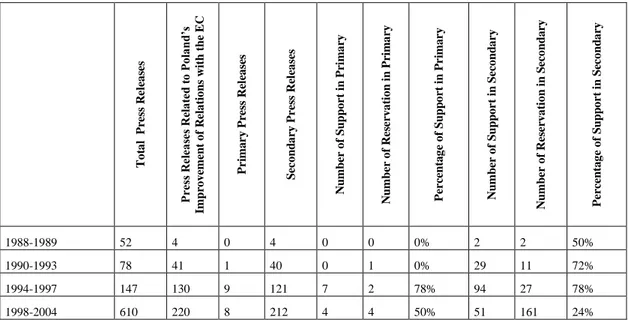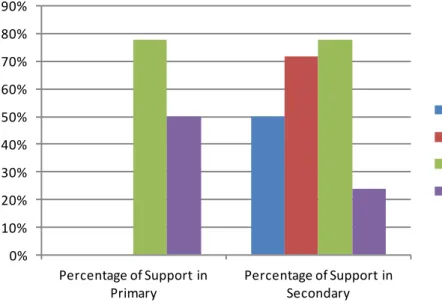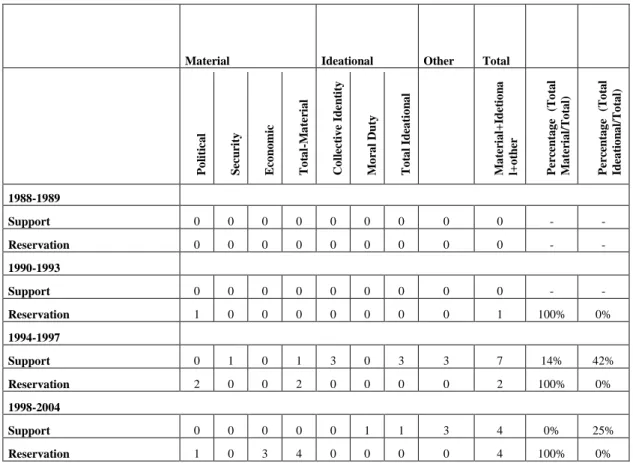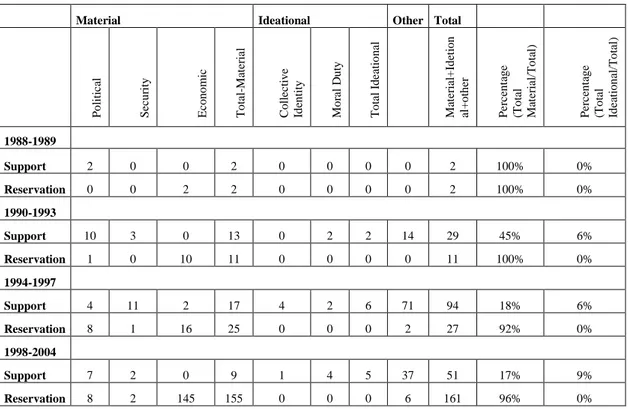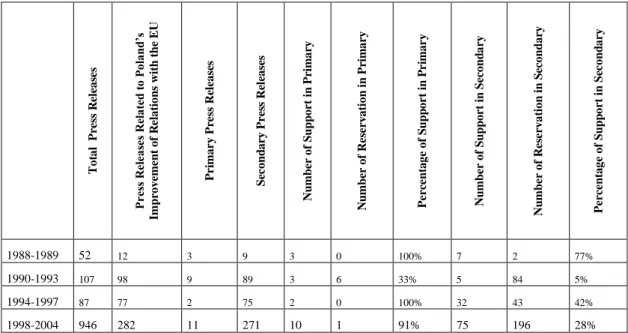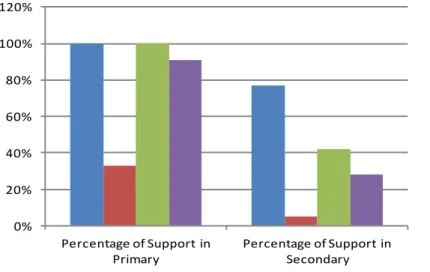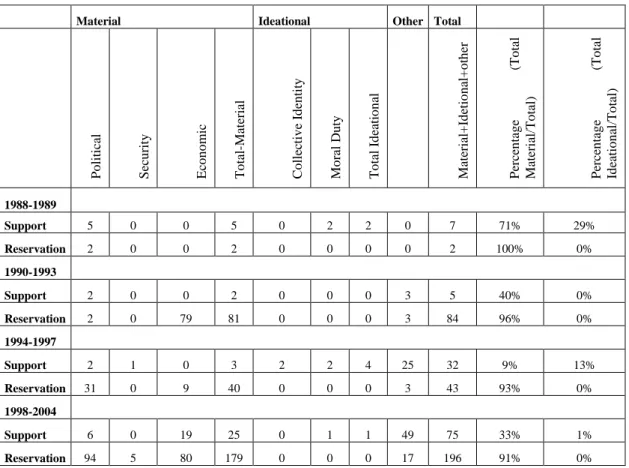AN INSTITUTIONALIST ANALYSIS TO THE EU‟S ENLARGEMENT POLICIES: A COMPARATIVE STUDY OF POLISH AND TURKISH
ACCESSION PROCESSES
A Ph. D. Dissertation
By
ESRA USLU KUTLUKAYA
Department of Political Science Ġhsan Doğramacı Bilkent University
Ankara January 2013
AN INSTITUTIONALIST ANALYSIS TO THE EU‟S ENLARGEMENT POLICIES: A COMPARATIVE STUDY OF POLISH AND TURKISH
ACCESSION PROCESSES
Graduate School of Economic and Social Sciences of
Ġhsan Doğramacı Bilkent University
by
ESRA USLU KUTLUKAYA
In Partial Fulfilment of the Requirements for the Degree of
DOCTOR OF PHILOSOPHY
in
THE DEPARTMENT OF POLITICAL SCIENCE
ĠHSAN DOĞRAMACI BĠLKENT UNIVERSITY ANKARA
I certify that I have read this thesis and have found that it is fully adequate, in scope and in quality, as a thesis for the degree of Doctor of Philosophy in Political Science. ……….
Assist. Prof. Dr. H. Tolga BölükbaĢı Supervisor
I certify that I have read this thesis and have found that it is fully adequate, in scope and in quality, as a thesis for the degree of Doctor of Philosophy in Political Science. ……….
Assoc. Prof. Dr. Aylin Güney Examining Committee Member
I certify that I have read this thesis and have found that it is fully adequate, in scope and in quality, as a thesis for the degree of Doctor of Philosophy in Political Science. ……….
Assist. Prof. Dr. Ioannis N. Grigoriadis Examining Committee Member
I certify that I have read this thesis and have found that it is fully adequate, in scope and in quality, as a thesis for the degree of Doctor of Philosophy in Political Science. ……….
Assist. Prof. Dr. Ali Tekin Examining Committee Member
I certify that I have read this thesis and have found that it is fully adequate, in scope and in quality, as a thesis for the degree of Doctor of Philosophy in Political Science. ……….
Assist. Prof. Dr. BaĢak Ġnce Examining Committee Member
Approval of the Graduate School of Economics and Social Sciences
………. Prof. Dr. Erdal Erel
iii ABSTRACT
AN INSTITUTIONALIST ANALYSIS TO THE EU‟S ENLARGEMENT POLICIES: A COMPARATIVE STUDY OF POLISH AND TURKISH
ACCESSION PROCESSES Uslu Kutlukaya, Esra
P.D., Department of Political Science Supervisor: Assist. Prof. Dr. H. Tolga BölükbaĢı
January 2013
European Union (EU) enlargement has been somewhat neglected theoretically in studies of European integration despite its importance both for member states, applicant states and the EU itself. The main purpose of this dissertation is to make a theoretical contribution to the literature through applying an institutionalist analysis to the attitudes of European Commissioners and member states as expressed through their speeches. The major research question of this dissertation is: „Which theory of institutionalism, rationalist or constructivist/sociological, better explains the attitudes of European Commissioners and member states towards deepening relations with Poland and Turkey?‟ In order to
answer this question, the different stages of the EU‟s Eastern enlargement are analyzed through the case studies of Turkey and Poland. The results of this analysis
iv
demonstrate that the logic of consequentialism rather than logic of appropriateness has prevailed in the formation of the attitudes of both European Commissioners and member states towards Poland and Turkey.
Keywords: Rationalist Institutionalism, Constructivist/Sociological Institutionalism, the European Commissioners, member states, Polish accession process, Turkish accession process, content analysis.
v ÖZET
AB‟NĠN GENĠġLEME POLĠTĠKALARINA KURUMSALCI BĠR BAKIġ: POLONYA VE TÜRKĠYE‟NĠN KATILIM SÜREÇLERĠNĠN
KARġILAġTIRMASI
Uslu Kutlukaya, Esra
Doktora, Siyaset Bilimi Bölümü
Tez Yöneticisi: Yard. Doç. Dr. H. Tolga BölükbaĢı
Ocak 2013
Avrupa Birliğinin geniĢlemesi, üye ülkeler, aday ülkeler ve Avrupa Birliği için önemine rağmen Avrupa entegrasyonunda teorik açıdan ihmal edilmiĢtir. Bu tezin temel amacı, AB Komisyonu üyelerinin ve üye devletlerin, yaptıkları konuĢmalar vasıtasıyla, tutumlarını kurumsalcı bir analiz yöntemiyle inceleyerek yazına teorik bir katkıda bulunmaktır. Bu tezin ana araĢtırma sorusu Ģudur: rasyonel veya inĢacı/sosyolojik kurumsalcı teorilerden hangisi AB Komisyonu üyelerinin ve üye devletlerin Polonya ve Türkiye ile iliĢkilerin derinleĢmesine iliĢkin tutumlarını en iyi Ģekilde açıklamaktadır? Bu soruyu cevaplamak için AB‟nin Doğu Avrupa geniĢlemesinin farklı aĢamaları Polonya ve Türkiye vaka çalıĢmaları üzerinden analiz edilmiĢtir. Analiz sonuçları, AB Komisyonu üyelerinin ve üye devletlerin Polonya ve
vi
Türkiye‟ye karĢı tutumlarının oluĢmasında uygunluk mantığından çok sonuçsalcılık mantığının hâkim olduğunu göstermektedir.
Anahtar Kelimeler: Rasyonalist Kurumsalcılık, ĠnĢacı/Sosyolojik Kurumsalcılık, AB Komisyonu üyeleri, Üye ülkeler, Polonya‟nın katılım süreci, Türkiye‟nin katılım süreci, Ġçerik analizi.
vii
ACKNOWLEDGMENTS
This dissertation becomes a reality with the intellectual, practical and emotional support of my husband and smile of my daughter. They have always trusted in and supported me. Therefore, I dedicated this dissertation to Mahmut Kutlukaya and Nisan Naz Kutlukaya.
I would like to thank my parents, Uslu and Kutlukaya families, for their support and patience. Without them, this dissertation would not have been possible. Also I should mention my father Erim Uslu who had always believed that I could overcome all the difficulties. I know that he is watching me at the sky and still supporting me.
In academic life, I owe my deepest gratitude to Assoc. Prof. Dr. Aylin Güney.
She gave me the strength to cope with any kind of discouragement and she was there whenever I needed support, not only with her intellectual knowledge but also with her heart. I would like to thank her for being a „driver‟ of my academic career.
I am also deeply grateful to Assist. Prof. Dr. H. Tolga BölükbaĢı and Assist.
Prof. Dr. Ioannis N. Grigoriadis for giving me valuable and insightful comments. I also like to thank Assist. Prof. Dr. Ali Tekin for being a part of this dissertation with
viii
his valuable comments and Assist. Prof. Dr. BaĢak Ġnce who left a permanent mark
on my academic career with all her support. It is also an honor for me to thank Prof. Dr. Metin Heper for his encouragement.
I also like to thank to my college Serkan Aziz Oral from the Banking Regulation and Supervision Agency of Turkey for his support and patience and my dearest friend Selin Akyüz for being always there to help me. Last but not least, I also like thank Güvenay Kazancı, our department secretary, for her incredible help
ix TABLE OF CONTENTS ABSTRACT ... iii ÖZET... v ACKNOWLEDGMENTS ... vii TABLE OF CONTENTS ... ix
LIST OF TABLES ... xiv
LIST OF FIGURES ... xvii
CHAPTER I: INTRODUCTION ... 1
1.1 Methodology ... 4
1.1.1 Research Question ... 4
1.1.2 Content Analysis ... 6
1.1.3 Codes ... 11
1.1.4 Limitations of the Method ... 15
1.1.5 Member State Selection ... 15
1.1.6 Case Selection ... 18
1.2 Chapters ... 22
1.3 Expected Contribution ... 26
CHAPTER II: REVIEW OF EXISTING LITERATURE ON RATIONALIST INSTITUTIONALISM CONSTRUCTIVIST/ SOCIOLOGICAL INSTITUTIONALISM AND THE EASTERN ENLARGEMENT OF THE EU... 28
x
2.1 The New Institutionalisms ... 29
2.2 Rationalist Institutionalism ... 33
2.2.1 Rationalist Institutionalism and EU Enlargement ... 38
2.3 Constructivist/ Sociological Institutionalism ... 39
2.3.1 Constructivist/Sociological Institutionalism and EU Enlargement ... 43
2.4 Liberal Intergovernmentalism ... 45
2.4.1 Liberal Intergovernmentalism and the Eastern Enlargement ... 46
2.5 Constructivist/Sociological Institutionalism and Eastern Enlargement ... 51
2.5.1 Strategic Use of Norms and Identities ... 52
2.5.1.1 Speech Acts ... 52
2.5.1.2 Rhetorical Action ... 53
2.5.2 Norms as Constituting Identity ... 54
2.5.2.1 Special Responsibility ... 54
2.5.2.2 Kinship-based Arguments ... 56
2.6 Comparison of Two Institutionalisms‟ Expectations and Hypothesis about Enlargement ... 57
2.7 Conclusion ... 59
CHAPTER III: POLISH ACCESSION TO THE EUROPEAN UNION ... 61
3.1 Road to PHARE ... 63
3.1.1 EU-Poland Relations... 63
3.1.1.1 Historical Context of Poland‟s Transition from Communist Rule... 63
3.1.1.2 The Non-Communist Government‟s First Policies ... 66
3.1.1.3 The Inception of Polish- EU Relations ... 68
3.1.1.4 The EU‟s First Response to Events in Central and Eastern Europe: Trade and Cooperation Agreements and PHARE ... 70
3.1.1.5 Attitudes of European Commissioners towards Poland ... 74
3.1.2 Attitudes of Member States towards Poland... 75
3.1.2.1 Germany ... 76 3.1.2.2 France ... 78 3.1.2.3 Great Britain ... 81 3.1.2.4 Spain ... 83 3.2 Europe Agreements ... 85 3.2.1 EU-Poland Relations... 85
xi
3.2.1.1 The Way to Find a Solution to the CEECs‟ and Polish Demands:
Europe (Association) Agreements with Poland ... 85
3.2.1.1.1 Other Proposals ... 93
3.2.1.2 Acceptance of the principle of CEECs‟ Membership ... 96
3.2.1.3 Attitudes of the European Commissioners towards Poland ... 103
3.2.2 Attitudes of Member States towards Poland... 105
3.2.2.1 Germany ... 105
3.2.2.2 France ... 109
3.2.2.3 Great Britain ... 112
3.2.2.4 Spain ... 115
3.3 Membership Application ... 118
3.3.1 The EU-Poland Relations ... 118
3.3.1.1 The Way to Limited Enlargement: From the Pre-Accession Strategy to Treaty of Amsterdam ... 118
3.3.1.1.1 The Pre-Accession Strategy ... 118
3.3.1.2 Attitudes of European Commissioners towards Poland ... 125
3.3.2. Attitudes of Member States towards Poland ... 126
3.3.2.1 Germany ... 126
3.3.2.2 France ... 129
3.3.2.3 Great Britain ... 132
3.3.2.4 Spain ... 134
3.4 Accession Negotiations ... 136
3.4.1 The EU-Poland Relations ... 136
3.4.1.1 The Process of Accession Negotiations ... 136
3.4.1.2 Attitudes of European Commissioners towards Poland ... 141
3.4.2 Attitudes of Member States towards Poland... 143
3.4.2.1 Germany ... 143
3.4.2.2 France ... 146
3.4.2.3 Great Britain ... 149
3.4.2.4 Spain ... 151
3.5 General Assessment ... 154
3.5.1 Comparison between Different Periods of Each Member State ... 154
3.5.1.1 Germany ... 155
xii
3.5.1.3 Great Britain ... 167
3.5.1.4 Spain ... 174
3.5.2 Comparison between Different Periods of Commissioners Speeches ... 178
3.5.3 Comparison of Member States‟ Attitudes towards Poland ... 181
CHAPTER IV: TURKISH ACCESSION PROCESS TO THE EUROPEAN UNION ... 187
4.1 Membership Application ... 189
4.1.1 EU-Turkey Relations ... 189
4.1.1.1 Historical Context of Turkish Politics ... 189
4.1.1.2 Brief History of EU-Turkish Relations ... 192
4.1.1.3 Turkey‟s Application for EU Membership ... 194
4.1.1.4 Attitudes of the European Commissioners towards Turkey ... 197
4.1.2 Attitudes of Member States towards Turkey ... 197
4.1.2.1 Germany... 197 4.1.2.2 France... 199 4.1.2.3 Great Britain ... 200 4.1.2.4 Greece ... 201 4.2 Customs Union ... 203 4.2.1 EU-Turkey Relations ... 203
4.2.1.1. Customs Union Negotiations ... 203
4.2.1.2 Attitudes of European Commissioners towards Turkey ... 206
4.2.2 Attitudes of Member States towards Turkey ... 210
4.2.2.1 Germany... 210
4.2.2.2 France... 213
4.2.2.3 Great Britain ... 216
4.2.2.4 Greece ... 218
4.3 From Helsinki Decision to Accession Negotiations ... 221
4.3.1 EU-Turkey Relations ... 221
4.3.1.1 From Candidacy to Accession Negotiations ... 221
4.3.1.2 Attitudes of Commissioners towards Turkey ... 229
4.3.2 Attitudes of Member State towards Turkey ... 233
4.3.2.1 Germany... 233
xiii 4.3.2.3 Great Britain ... 259 4.3.2.4 Greece ... 266 4.4 Accession Negotiations ... 275 4.4.1 EU-Turkey Relations ... 275 4.4.1.1 Stalemate in Relations ... 275
4.4.1.2 Attitudes of European Commissioners towards Turkey ... 281
4.4.2 Attitudes of Member States towards Turkey ... 283
4.4.2.1 Germany... 283
4.4.2.2 France... 294
4.4.2.3 Great Britain ... 304
4.4.2.4 Greece ... 312
4.5 General Assessment ... 319
4.5.1 Comparison between Different Periods of Each Member State ... 319
4.5.1.1 Germany... 319
4.5.1.2 France... 327
4.5.1.3 Great Britain ... 335
4.5.1.4 Greece ... 342
4.5.2 Comparison between Different Periods of Commissioners Speeches ... 348
4.5.3 Comparison of Member States‟ Attitudes towards Turkey ... 351
CHAPTER V: CONCLUSION ... 358
5.1. Comparison of the European Commissioners‟ and Member States‟ Attitudes towards Poland and Turkey ... 358
5.1.1 Attitudes of European Commissioners towards Poland and Turkey ... 358
5.1.2 Attitudes of Member State‟s towards Poland and Turkey ... 364
5.2 Concluding Remarks ... 381
xiv
LIST OF TABLES
Table 1: Comparison of Rationalist Institutionalism and Constructivist/Sociological
Institutionalism ... 44
Table 2: Member state enlargement preferences for CEECs ... 47
Table 3: Member State Preferences on Turkish Accession ... 47
Table 4: Comparison of Rationalist and Constructivist/Sociological Institutionalisms on EU Enlargement ... 58
Table 5: Comparison of Different Periods for Germany ... 155
Table 6: Germany Primary Press Releases ... 157
Table 7: Germany Secondary Press Releases ... 159
Table 8: Comparison of Different Periods for France ... 161
Table 9: France Primary Press Releases ... 163
Table 10: France Secondary Press Releases ... 165
Table 11: Comparison of Different Periods for Great Britain ... 167
Table 12: Great Britain Primary Press Releases ... 170
Table 13: Great Britain Secondary Press Releases ... 171
Table 14: Comparison of Different Periods for Spain ... 174
Table 15: Spain Primary Press Releases ... 176
Table 16: Spain Secondary Press Releases ... 177
Table 17: Comparison between Different Periods of European Commissioners‟ Speeches ... 178
xv
Table 18: Poland-European Commissioners‟ Speeches-Material/Ideational Factors
... 179
Table 19: Comparison of Attitudes of Member States between 1988 and 1989 ... 181
Table 20: Comparison of Attitudes of Member States between 1990 and 1993 ... 182
Table 21: Comparison of Attitudes of Member States between 1994 and 1997 ... 183
Table 22: Comparison of Attitudes of Member States between 1998 and 2004 ... 184
Table 23: Comparison of Different Periods for Germany ... 319
Table 24: Germany Primary Press Releases ... 322
Table 25: Germany Secondary Press Releases ... 325
Table 26: Comparison of Different Periods for France ... 327
Table 27: France Primary Press Releases ... 331
Table 28: France Secondary Press Releases ... 333
Table 29: Comparison of Different Periods for Great Britain ... 335
Table 30: Great Britain Primary Press Releases ... 338
Table 31: Great Britain Secondary Press Releases ... 339
Table 32: Comparison of Different Periods for Greece ... 342
Table 33: Greece Primary Press Releases ... 345
Table 34: Greece Secondary Press Releases ... 346
Table 35: Comparison between Different Periods of European Commissioners Speeches ... 348
Table 36: Turkey-European Commissioner‟s Speeches-Material/Ideational Factors ... 349
Table 37: Comparison of attitudes of Member States between 1987 and 1989 ... 351
Table 38: Comparison of Attitudes of Member States between 1990 and 1995 ... 351
Table 39: Comparison of Attitudes of Member States between 1996 and 2004 ... 352
Table 40: 1996-2004 - Statistical Tests for Comparing Support Rates in Primary Releases (p-values)... 353
Table 41: Comparison of Attitudes of Member States between 2005 and 2012 ... 354
Table 42: 2005-2012 - Statistical Tests for Comparing Support Rates in Primary Releases (p-values)... 355
Table 43: Comparison of Attitudes of European Commissioners towards Poland and Turkey between 1987 and 1989 ... 359
Table 44: Comparison of Attitudes of European Commissioners towards Poland and Turkey between 1990 and 1995 ... 360
xvi
Table 45: Comparison of Attitudes of European Commissioners towards Poland and Turkey between 1994 and 2004 ... 361 Table 46: Comparison of Attitudes of European Commissioners towards Poland and Turkey between 1998 and 2012 ... 362 Table 47: European Commissioners Enlargement Preferences for Poland and Turkey ... 364 Table 48: Comparison of Attitudes of Member States towards Poland between 1988 and 1989 ... 365 Table 49: Comparison of Attitudes of Member States towards Turkey between 1987 and 1989 ... 365 Table 50: Comparison of Attitudes of Member States towards Poland between 1990 and 1993 ... 367 Table 51: Comparison of Attitudes of Member States towards Turkey between 1990 and 1995 ... 368 Table 52: Comparison of Attitudes of Member States towards Poland between 1994 and 1997 ... 370 Table 53: Comparison of Attitudes of Member States towards Turkey between 1996 and 2004 ... 371 Table 54: Comparison of Attitudes of Member States towards Poland between 1998 and 2004 ... 377 Table 55: Comparison of Attitudes of Member States towards Turkey between 2005 and 2012 ... 377 Table 56: Member State Enlargement Preferences ... 380
xvii
LIST OF FIGURES
Figure 1: Support Rates in Primary and Secondary Press Releases for Germany ... 156
Figure 2: Support Rates in Primary and Secondary Press Releases for France ... 163
Figure 3: Support Rates in Primary and Secondary Press Releases for Great Britain ... 169
Figure 4: Support Rates in Primary and Secondary Press Releases for Spain ... 175
Figure 5: Comparison of Support Rate in Different Periods for Germany ... 322
Figure 6: Comparison of Support Rate in Different Periods for France ... 330
Figure 7: Comparison of Support Rate in Different Periods for Great Britain ... 337
Figure 8: Comparison of Support Rate in Different Periods for Greece... 344
Figure 9: Comparison of Support Rates of European Commissioners towards Poland and Turkey ... 383
1
CHAPTER I
INTRODUCTION
It has been nearly 54 years since Turkish relations with the European Economic Community (EU)1 began in 1959. Turkey first applied for membership in 1987, gained candidate status at the Helsinki European Council of 1999, before formal accession negotiations were launched on 3 October 2005. Turkey‟s candidacy is one example of the dual process followed by the EU of deepening and institutional transformation, simultaneous to widening or enlargement. Since its formation, the EU has completed six rounds of enlargement. Although Turkey‟s application took
place before the Central and Eastern European Countries‟ (CEEC) applications, Turkey is still waiting to become a member of the EU while Poland, the Czech Republic, Slovakia, Slovenia, Latvia, Lithuania, Estonia, Romania, Bulgaria,
1 The name of the European Economic Community (ECC) altered in 1967 when the European Community (EC) became the new name. In 1992, with the introduction of the Maastricht Treaty, the name changed again to the European Union (EU). The name EU will be used in this dissertation to refer to all periods of the Community‟s history.
2
Hungary, the Cyprus Republic and Malta have all become members. The starting point for this dissertation is the quest to explain the slow progress of Turkish relations with the EU.
Analysis of the literature on European integration reveals that the EU‟s
enlargement has been somewhat neglected theoretically in studies of European integration. The literature has considered Central and Eastern European enlargement as the most challenging and complicated round. Many questions arose during this round, for example as to why and when the EU decided to enlarge in this way; how the candidates were chosen; and which criteria were used. Due to this complicated character, the most prominent scholars of EU integration have conceptualized the EU‟s Eastern enlargement as a theoretical puzzle (Schimmelfennig 1999, 2001;
Schimmelfennig and Sedelmeier 2002). Specifically, this challenge has led to a new theoretical debate in the field between rationalist and sociological/constructivist institutionalism.
For rationalist institutionalists, players with decision-making and institutional power, such as the governments of EU member states in this case, are seen as the principal actors of enlargement, whereas for constructivist/sociological institutionalists, the principal actors are norm and principle entrepreneurs, such as the European Commission. The European Commission, among other supranational institutions of the EU, such as European Parliament or European Council, can be seen in this light due to its special role in the enlargement process. In particular, it monitors the compliance of candidate states with EU requirements with the help of progress reports, using these to advise the European Council about the preparedness of a candidate state for membership.
3
Considering how these actors reach policy decisions, rationalists argue that utility driven EU member states make use of strategic bargaining and negotiation about the costs and benefits of enlargement for their own national interests. In contrast, for constructivist/sociological institutionalists, decisions on enlargement policy are supposedly taken collectively by member states with the help of European Commission, in accordance with the constitutive norms, principals and shared identity of the Union. In short, the driving force behind the enlargement process is the logic of consequentiality for rationalist institutionalists and the logic of appropriateness for constructivists/sociological institutionalists.
This dissertation aims to explain the enlargement policies of member states and European Commissioners2 by taking into account this rationalist-constructivist debate. With the help of the case studies of Turkey and Poland, different stages of EU enlargement are analyzed in order to determine the extent to which the European Commissioners and member states acted according to the logic of consequentialism or logic of appropriateness.
This dissertation posits five hypotheses to be answered through the case studies. The first is that „the support the European Commissioners‟ offer for improving Polish and Turkish relations with the EU is nearly the same.‟ The second hypothesis is that „the logic of appropriateness best explains the attitudes of the European Commissioners.‟ The third hypothesis is that Poland‟s EU candidacy has been prioritized over Turkey‟s.‟ Fourth, „France, Germany, Great Britain, Spain and Greece can be categorized as „drivers‟ or „brakemen‟, and that their positions do not
change within the time periods studied.‟ The final hypothesis is that „the logic of
2 In the official documents of the EU, „European Commissioner‟ and „Member of the European Commission‟ were used interchangeably. From now on, „European Commissioner‟ will be used in this dissertation.
4
consequentialism has prevailed in the attitudes of member states towards Poland and Turkey.‟
1.1 Methodology
1.1.1 Research Question
The main research question of this dissertation is: Which theories of institutionalism, rationalist or constructivist, explains the attitudes of European Commissioners and member states towards Poland and Turkey? In order to answer this question, certain additional questions also have to be addressed: Are the levels of support of European Commissioners for improvement in EU relations with Poland and Turkey the same? Did member states make certain prioritizations amongst applicants in the enlargement process? Who have been the drivers and brakemen concerning Poland‟s and Turkey‟s European aspirations? Do the positions of member states change within the time periods studied? Is there a partisan effect in any change of positions? What were the fundamental determinants of member states‟
preference formations? Did the European Commission decide to open accession negotiations with the candidate countries before making policy or institutional reforms? Which factors have had more impact on European Commissioners‟ and member states‟ decision to offer candidacy to Turkey and accept Poland as a member
state?
The dependent variable that this dissertation aims to explain is the attitudes of European Commissioners and member states towards Poland‟s and Turkey‟s
5
affect attitudes are material factors, such as economic interests, security interests and political interests, while for constructivist/sociological institutionalists, the independent variables that affect attitudes are ideational factors, such as collective identity and moral duty.
With respect to European studies, Moravcsik‟s liberal intergovernmentalism
is the best example of the application of rationalist institutionalism to the field of European integration. The Moravcsik‟s methodology, as he (1998:19) points out, is the “formulation of concrete and falsifiable hypotheses from competing theories, the
disaggregation of case studies to multiply observations and reliance whenever possible on primary sources”. When liberal intergovernmentalism is applied to the EU‟s enlargement policies, the main actors of enlargement are the member state
governments because applicant countries are assumed to have a weak negotiating position with member states due to their desire to join the EU. Consequently, Moravcsik‟s rationalist framework, and its application to enlargement studies by
Schimmelfennig is used in this dissertation to determine whether or not rationalist institutionalism can explain the attitudes of European Commissioners and member states.
In contrast, European enlargement studies assume that decisions on enlargement policy are taken collectively by EU member states with the help of European Commission. Thus, the latter has a special role in enlargement. Member states justify enlargement on the basis of the responsibilities and duties resulting from various factors: their shared (European) identity, culture and history; being a part of the same family (sense of kinship); and belonging to the EU. Constructivist/sociological institutionalists mainly use constructivist tools, such as discourse and content analysis, in their evaluation of such social identities, values
6
and norms (Sjursen and Romsle, 2006). The constructivist/sociological institutionalism and its application to enlargement studies by Fierke and Wiener, Schimmelfennig, Sjursen and Sedelmeier is used in this dissertation to find out whether or not constructivist/sociological institutionalism can clarify the attitudes of European Commissioners and member states.
1.1.2 Content Analysis
Content analysis is a research method that uses a set of procedures to make valid inferences from text (Weber, quoted in Neuendorf, 2002:10) or for making replicable and valid inferences from data to their context (Krippendorff, 1980:21). Content analysis is widely used in different academic fields, such as political science, sociology, cultural studies, marketing and media studies, literature and rhetoric. Content analysis includes analysis of the manifest and/or latent content of a text. Manifest content can be described as what is common to all, or what everyone can agree to (Krippendorff, 2004: 20), while latent content can be termed reading between the lines, or discovering hidden motivations (Krippendorff, 2004: 141).
According to Krippendorff, one of the tasks3 that content analysis is used for by researchers is problem-driven content analysis. Krippendorff (2004:340) describes this as “motivated by epistemic questions about currently inaccessible phenomena,
events or processes that the analysts believe texts are able to answer.” In such content analyses, as Krippendorff explains, analysts begin with research questions and proceed to find analytical paths to their answers through the choice of suitable texts.
3 According to Krippendorff, the other two areas are text-driven content analyses and method-driven content analyses.
7
This dissertation uses problem-driven content analysis to answer the research question described earlier. That is, this study employs the content analysis of key documents to understand whether or not material factors, such as political, security or economic interests, or ideational factors, such as collective identity and moral duty, led the European Commissioners and member states to support Poland‟s
membership and the opening of accession negotiations with Turkey. These documents were selected from the FACTIVA database and the European Commissioners‟ speeches that were obtained from the RAPID database. RAPID4 is the official data base of the European Union. It includes EU press releases, memos, speeches, agendas, etc. released by the EU. The analysis aimed to reveal the documents‟ manifest content rather than latent content.
The attitude of a member state towards an applicant state is revealed both in the speeches of the political and bureaucratic officials of member states and through media analyses. The speeches made by politicians can be obtained through press releases. In the content analyses literature, Lexis-Nexis and FACTIVA are the two research databases usually used for such systematic media analyses. Regarding the availability of these databases, the libraries of Bilkent University and Middle East Technical University were consulted. Since Bilkent University library has access to FACTIVA5 , this database was selected for this dissertation.
Using RAPID, the relevant speeches of Commissioners were captured by applying date and text filters. The selected speeches were then analyzed to identify which kind of institutionalism, rationalist institutionalism based on economic, security and/or political interests, or constructivist/sociological institutionalism,
4 The analysis from RAPID database was conducted since December 2011 using the internet site http://europa.eu/rapid/search.htm
5
8
based on European identity and/or moral duty, better explains the attitudes of European Commissioners towards Poland and Turkey. Regarding the relations of member states with Poland and Turkey, FACTIVA was used to search through newspapers, such as the Financial Times and Times, and newswires like Reuters, Agency Europe and Dow Jones. The relevant press releases found using date and text filters were then analyzed to identify whether or not EU member states backed Poland and/or Turkey in their EU membership bids. In other words, the analysis aimed to identify the drivers and brakemen for Poland and Turkey. In addition, the analysis aimed to reveal whether material or ideational factors dominate relations between particular member states and Poland and Turkey. Tables and graphs were used to demonstrate the results. Because significant numbers of relevant primary press releases were captured from FACTIVA, specifically for 1996-2004 and 2004-2012 for Turkey, it was also possible to conduct statistical tests on the data to support the study‟s qualitative findings. Statistical tests were also conducted using statistical
software in order to determine the significance of attitudinal differences between successive governments within an EU member state or attitudinal changes resulting from domestic developments within member states. Although there may be other plausible ways to account for the attitudes of the European Commissioners or member states‟ towards EU enlargement to include Poland and Turkey, this study
aimed to determine the most convincing explanation, based on the available empirical evidence and in terms of the theoretical framework of the dissertation.
As outlined above, the primary sources in this dissertation are selected speeches of European Commissioners captured from RAPID, and selected speeches of politicians from selected member states obtained from FACTIVA. Additionally, secondary sources were also used, including newspaper or newswire releases
9
selected from FACTIVA and other books and articles about the EU‟s Eastern enlargement and the accession processes of both Poland and Turkey.
Database searching was achieved by using filters such as date, subject and region. For the RAPID database, in the „Search Options‟ section, „Turkey‟ or „Poland‟ was typed. In the „Types‟ section, „SPEECH: EC Speech‟ was chosen. In the „Date Range‟ section, relevant dates were entered into the „Choose a date range‟.
Using this filtering produced a list of candidate source speeches. The relevant speeches for this study were selected by reading them all.
With respect to FACTIVA, in order to analyze, for example, Poland‟s
relations with Germany in the period 1994-1998, „Poland and Germany‟ was first typed into the search builder. This search was then narrowed using „Poland‟ as the „Region‟ filter. Next, „European Union‟ was entered into the „Subject‟ filter. Finally,
date was also filtered to select particular time periods. This process produced a list of 677 press releases for the period 1994-1998. Using a similar process to analyze Germany‟s relations with Turkey, FACTIVA listed 312 press releases for the period
of 1990-1995.
Krippendorff (2004:113) suggests that when researchers analyze a sample of texts in place of a larger population of texts, they need a sampling plan to ensure that the textual units sampled do not bias answers to the research question. It is suggested (Frerichs, 2008: 3) that random sampling is a statistical sampling method where each unit remaining in the population has the same probability of being selected for the sample. In this study, the population was all the press releases available from FACTIVA for a single country, while the sample was the press releases chosen for analysis. In some periods, after using region and subject filters, enormous number of press releases appeared which were almost impossible to analyze without computer
10
software. In these cases, random sampling was used. Two main criteria were used for this sampling process. First, if the number of press releases produced from FACTIVA concerning a particular relationship was above 2,000, 50 percent were chosen for further analysis. Second, if the number of press releases was above 4,000, 20 percent were chosen. For instance, having applied the filters described above, FACTIVA listed 3,683 press releases regarding German-Turkish relations for the period 1996-2004, so according to the sampling criteria 1,841 were chosen for further analysis (i.e. Articles with even line numbers are chosen -press releases corresponds to the line 2, 4, 6, 8…-). For Turkish-Greek relations, for the period 1996-2004, 7,031 press releases appeared so 1,406 of them were randomly chosen for analysis (i.e. Every fifth article is chosen -press releases corresponds to the line 5,10,15,20...-) For German-Polish relations for 1998-2004, FACTIVA listed 4,419 press releases so 883 of them were randomly selected for the analysis by applying the above mentioned selection algorithm.
The selected press releases were each read, using the highlight function of the Word 2003 program to identify whether they were relevant to a specific relationship within the context of EU enlargement. This was necessary to exclude irrelevant press releases for tenders, OECD data, economic data or same press releases. For example, this process left 147 out of 677 press releases relevant press releases for German-Polish relations and 117 out of 312 press releases for German-Turkish relations.
In the content analysis literature, computer software programs such as NVivo, ATLAS.ti or MAXQDA are used for the systematic analysis of large numbers of texts. However, for this dissertation, the content of press releases and speeches needed to be analyzed individually by hand in order to reveal whether or not the member states or Commissioners supported the aspirations of Poland and Turkey,
11
and the reasons behind their support or reservation. The available computer software did not meet the needs of this study since it had to identify the specific tone of each document in order to avoid drawing false conclusions on the basis of a computerized analysis. However, when the number of press releases obtained from FACTIVA for a specific relationship exceeded 2,000, statistical random sampling methods are employed.
1.1.3 Codes
Krippendorff (2004:97) describes units as “wholes that analysts distinguish and treat as independent elements”. The units of analyses in this dissertation are individual press releases or „EC Speeches‟. All the categories, themes and codes used
in the analysis were derived from the rationalist institutionalist and sociological/constructivist institutionalist literature. Specific issues within the codes were derived from the analysis of the two kinds of units, namely „EC Speeches‟ and
press releases. The main categories identified were material factors and ideational factors. The themes falling under the category of material factors were political interest, security interest and economic interest, while the themes under the category of ideational factors were the EU‟s collective identity and moral duties. The Codes
are as follows
I-Material Factors:
1) Political Interest:
- Political Reasons: Whether or not political support or reservation is mentioned within the relevant text is searched. Political issues include, for Poland, the role of the EU in its transition to democracy and a
12
market economy, German unification, border claims, for Turkey, human rights, political reforms, Copenhagen Criteria, minority problems, the Cyprus problem, disputes in Aegean, ban of political parties, death penalty or for both Poland and Turkey, the own interests of the member state.
- Geopolitical Reasons: For Poland, a fear of German dominance in the EU, shift of EU‟s center of gravity, fear of a shift of the EU‟s
interest from Mediterranean states, Poland‟s strategic importance; for Turkey, its strategic importance, role as a „bridge‟ to the Muslim
World, and a benchmark for democracy in the Muslim World, preventing Turkey from drifting towards Islamic fundamentalism. - Europhobia: For texts involving Great Britain, the desire for a looser
federation of states, a fear of further deepening of the EU.
- Inefficiency of the EU’s institutional system: Reservations about enlargement, particularly regarding voting procedures, fears about the EU‟s absorption capacity and ability to assimilate and integrate new
member states.
- Deepening versus Widening: the priority member states or the EU give to widening or deepening.
2) Security Interest:
- European Security: How much improved relations of Poland or Turkey with the EU contribute to European security, implications for EU energy security.
- European Stability and Peace: Contribution of improved relations to European stability and peace.
13
- Immigration, Refugees, Illegal Drug trafficking: Fear of illegal immigration, refugee flows, border control issues and illegal drug trafficking.
3) Economic Interest:
- Expansion of Markets: Support for the improved relations in order to expand markets.
- Competition in the EU market: Concern over sensitive sectors for member states, such as agriculture, coal, steel, etc.
- Competition for EU funds: Member states‟ fears of reduced shares of EU funds, or diversion of EU funds towards Turkey or Poland. - Unemployment: Fear of rising of unemployment due to enlargement,
specifically the free movement of Polish and Turkish workers into the EU.
- Contribution to the EU budget: Member states‟ fears of increased contributions to the EU budget to fund enlargement.
II-Ideational Factors
1) EU’s Collective Identity
- Common History: The emphasis of common history is analyzed. - Sense of Kinship: Kinship based analogies, such as being part of a
family, cousin, sister, etc.
- Common Values: Common values, common culture, EU values, common norms.
- Common Religion: Phrases such as „Christian Club‟, „religious Berlin Wall‟, not sharing a common religion with Turkey.
14
2) Moral Duty
- Special Responsibility: Sense of responsibility towards Poland and Turkey, for Turkey, the phrase Pacta Sunt Servanda (agreements should be respected).
- Overcoming the Division of Europe: Phrases such as „overcoming the division of Europe‟, „unification of the continent‟.
Within the selected texts, the support or reservation of European Commissioners and member states for Poland‟s or Turkey‟s European aspirations, and the factors, material or ideational, behind this support or reservation were analyzed using these coding criteria. If both support and reservation were observed within the same text, it was considered as expressing „reservation‟. To illustrate, a phrase like “Greece will support Turkey‟s application for membership of the European Community if there is a satisfactory settlement of the Cyprus problem”
was counted as expressing political reservation. Although non-compliance with the Copenhagen Criteria was coded as political reservation, a sentence like “We want to help Turkey along the road towards full compliance with the Copenhagen criteria”
was not coded as political reservation.
As well as the specific codings described above, a general assessment section was also included in the content analysis of the documents. This allowed comparison of the relationship between each member state or European Commissioner and Poland or Turkey across different time periods. An EU member state was defined as a driver of enlargement if the content analysis revealed over 65 percent support for Poland or Turkey in primary documents and over 50 percent support in secondary documents. EU Commissioners were defined as drivers if the analysis revealed over 65 percent support in their speeches for Turkey‟s or Poland‟s candidacy. On the
15
other hand, an EU member state or EU Commissioner was defined as a brakeman if analysis of the primary and secondary press releases or speeches respectively showed less than 35 percent support for the candidates. EU member states or Commissioners whose statements were analyzed as falling between 35 and 65 percent support were called „no label‟ as being neither a driver nor a brakeman.
1.1.4 Limitations of the Method
There are various limitations to the results that can be obtained by employing the methodology described above. The first one is language. The searches were done in English in both RAPID and FACTIVA. Therefore, speeches or press releases in other languages, such as French Spanish, Polish, German, Turkish, etc., could not be included in the study.
Secondly, it is not clear whether the speeches included in the RAPID database reflect the EU‟s official public opinion or reflect the personal views of the speakers.
However, this difference is not taken into account in this study, with all speeches being accepted as the official diplomatic opinion of the EU.
Thirdly, the research is limited to those press releases and speeches obtainable via FACTIVA and RAPID. Press releases that are accessible through other databases, or speeches that are not included in RAPID, were not analyzed.
1.1.5 Member State Selection
Although there were 12 members of the EU in the 1990s, following Moravcsik and Schimmelfennig, only Germany, France, Great Britain and Spain were chosen for the analysis regarding Poland, and only Germany, France, Great Britain and Greece were chosen for the analysis regarding Turkey. Of these
16
countries, Germany and Great Britain are considered to be drivers of Eastern enlargement. Great Britain favors widening over deepening whereas Germany favors widening and deepening at the same time. France and Spain are the brakemen and favor deepening over widening. Regarding Turkey‟s candidacy, Great Britain has
been a driver whereas Greece can be considered a brakeman, although its attitude has varied. Similarly, the attitudes of Germany and France have varied during Turkey‟s
accession process.
According to the liberal intergovernmentalist literature, Germany is the main supporter of Poland‟s accession process because the Second World War left Poland
and Germany with a legacy of common problems of minorities and boundaries. After the end of the Cold War, there was reconciliation in their relations and the problems of minorities and boundaries were solved peacefully. For instance, German foreign minister Hans Dietrich Genscher, as early as 1991, arranged the Weimar Triangle meetings between the foreign ministers of Germany, France and Poland in order to rebuild confidence between them following the end of the Cold War and German unification. These meetings allowed Poland have to gain privileged access to Germany and France, and to campaign for improvement of her European aspirations. British Prime Minister Margaret Thatcher, as early as November 1988, visited Poland to show her support for Solidarity and Poland‟s transition to democracy, and Great Britain went on to become one of the main proponents of Poland‟s accession to
the EU. Regarding the brakemen, France and Spain were specifically chosen because of their resistance to the Association Agreement with Poland. Although France, especially President Mitterrand, supported Poland‟s transition to democracy by
encouraging Solidarity and offering economic help, France also emphasized that deepening should happen before widening, warning that “enlargement would take
17
tens and tens of years” (Mitterrand, quoted in Sjursen and Romsloe, 2006: 142).
Economic interests also made it hard for France and Spain to reach generous trade and association agreements with Poland. Due to specific sectors in their countries, namely agriculture for France and steel for Spain, they engaged in hard bargaining over Poland‟s association negotiations. However, having opposed enlargement to
begin with, France and Spain later altered their opinions and accepted Poland and the other CEECs as EU members.
With respect to Turkey, Greece is known to be the main brakeman due to the Cyprus issue and other disputes in the Aegean. However, the earthquakes in Turkey and Greece in 1999 were a positive turning point for Greek-Turkish relations, and this reconciliation led Greece not to veto Turkey‟s candidacy at the Helsinki
European Summit. Germany, especially Christian Democrat Helmut Kohl, who was in office between October 1982 and October 1998, on the other hand, had economic reservations over its fear of mass migration of Turkish workers into Germany. With the inauguration of Social Democrat Gerard Schroeder to the Chancellorship in October 1998, the attitude of Germany towards Turkey changed positively, before becoming more negative again since Christian Democrat Angela Merkel‟s came to
power in November 2005. This same partisan effect also applies to France. President Chirac who came to office in May 1995, for most of his presidency, supported Turkish accession, whereas President Sarkozy, who was in office between May 2007 and May 2012, strongly opposed full membership for Turkey. Thus, it can be seen that there are more drivers and brakemen in Polish and Turkish accession than expected, and that the attitudes of some member states towards Turkey in particular have varied with the changes of government or domestic developments.
18
1.1.6 Case Selection
With respect to case selection, a number of striking similarities between the Polish and Turkish cases make them valuable for comparative analysis. Both countries have strategic importance, large populations and large agricultural sectors, which are the main similarities that make Poland and Turkey important cases for comparison together with other similarities, such as their western orientation and the unconsolidated character of their democracies at the time of their membership applications. To start with the first similarity of strategic importance, Poland shares frontiers with Slovakia, Russia, Lithuania, Belarus, Ukraine, the Czech Republic and Germany, and this central European location increases Poland‟s strategic
significance. In particular, sharing a border with Germany contributed to Poland‟s EU membership bid in two ways. First, as Schimmelfennig (Schimmelfennig, 2004: 87) suggests, geographical proximity increases the chances of cross-border trade and capital movements. Secondly, in order to maximize her security interest, Germany made a readmission agreement with Poland to accept back immigrants mainly coming from Russia, Belarus and Ukraine that Germany expelled. That is, Poland‟s accession to the EU was in Germany‟s economic and security interest so this is one of the reasons why Germany became a driver of Poland‟s candidacy at the beginning
of the 1990s. Turkey, meanwhile, is not only a bridge between Europe and Asia geographically but also a bridge between Europe and the Muslim world. As the only secular, western-oriented Islamic state, Turkey is acknowledged as being a pole of stability in its region. In the supportive releases and support speeches, this geostrategic importance is underlined.
19
The second similarity is having large populations. Poland is the largest CEEC with a population of 38.6 million (European Commission, 1997: 7), while Turkey‟s population was already 53 million in 1988, so that Turkey was expected to have a bigger population than any EU member state (European Commission,1989:5). This is a constraint for both countries as large populations create a right to a larger number of seats in the EU parliament and greater voting weight in the European Council‟s
decision mechanism. This created tensions during accession negotiations. For instance, although Spain and Poland have similar populations, in the negotiations for the Treaty of Nice, the French presidency tabled a proposal giving Poland 26 votes and Spain 28 votes on the European Council. Poland rejected this and in the end 27 votes were allocated to both countries, with 29 votes going to the more populous Germany and France. In the negotiations for the European Constitution, voting rights were also a problem. A more egalitarian approach in terms of population was proposed, but Spain and Poland did not want to lose their voting rights and blocked the European Constitution in the European Council of December 2003. For Turkey, Schimmelfennig (2008:1) suggests that “Although the EU‟s institutional rules reduce
the effect of population size on political power, Turkey would rank among the big member states with regard to seats in the European Parliament and votes in the Council and could gain at least considerable blocking power.” As well as voting
implications, population size also affects the distribution of EU funds.
The existence of a large agricultural sector is a third similarity of Poland and Turkey which generates a problem for the EU‟s Common Agricultural Policy (CAP)
and creates a demand for high net payments from the structural funds. At the time of Turkish application, more than 50 percent of its labor force (European Commission, 1989: 6) was employed in agriculture, while in 1995, 26.9 percent of Poland‟s labor
20
force (European Commission, 1997: 22) was employed in agriculture. In the accession negotiations with Poland, due to economic reservations, France and Spain asked for a transition period for Poland before receiving the full benefits from the CAP. At the same time, Germany and Great Britain demanded changes in the CAP to decrease the size of their contributions to the EU budget. In addition, Poland‟s and Turkey‟s EU membership had the significant implications for labor migration
towards the EU market. There were fears in EU public opinion about both Turkish and Polish workers6 migrating into the EU labor market and causing high unemployment in member states. Consequently, under Social Democrat Gerard Schroeder, Germany, together with Austria, asked for a seven-year transition period before allowing free movement of Polish workers after enlargement. Germany also raised similar concerns over possible mass immigration of Turkish workers following Turkey‟s EU membership application.
The fourth similarity is Poland‟s and Turkey‟s European orientation. Integration into Western political and security structures, namely Europeanization and westernization, have been the main foreign policy aims of successive Turkish and Polish governments since 1944 and 1989 respectively. In order to realize this aim, Turkey applied to the European Economic Community on 31 July 1959 in order to sign an association agreement. In 12 September 1963, Turkey became an associate member of the EU by signing an Association Agreement, the Ankara Agreement, which created the Association Council. In 14 April 1987, Turkey officially applied for full membership of the EU. Two years later, on 18 December 1989, the European Commission presented its opinion on Turkey‟s application, advising against starting
accession negotiations due to various obstacles, size, population, economic
6 For Turkish workers, the name „gastarbeiter‟ is used, for the Polish workers, the name „Polish Plumbers‟ is used.
21
backwardness and democratic deficits, to Turkish accession. In contrast, diplomatic relations between the EU and Poland were established in 1988 and the association agreement, the Europe Agreement, was signed on 16 December 1991 and entered into force on 1 February 1994. This became the legal basis of Poland‟s relations with
the EU in the early 1990s. On 5 April 1994, Poland presented its application for membership of the EU. In the Luxembourg European Council of December 1997, the EU decided the list of the candidate countries for membership according to the Copenhagen Criteria of 1993 and Agenda 2000 proposals of the Commission. Poland, together with Hungary, the Czech Republic, Estonia, Slovenia and Cyprus, was declared to start accession negotiations in 1998. In that summit, Turkey was not accepted as a candidate country but Turkey‟s eligibility was again confirmed.
Helsinki European Council was an important cornerstone of the EU-Turkey relations. At the Helsinki European Council of 1999, the European Council declared Turkey as a candidate state but the accession talks were not started. The change of government in Germany and change of attitude of Greece towards Turkey were the main developments that led to the positive Helsinki decision. In the European Council Summit on December 17, 2004, the European Council accepted that Turkey fulfilled the Copenhagen Political Criteria and decided to open accession talks on October 3, 2005. Turkey‟s accession process is still continuing since October 3, 2005.
The last similarity is the unconsolidated character of both Polish and Turkish democracy, which is important in terms of compliance with the Copenhagen political criteria. Although both countries had completed their transition to democracy by the time of application, neither of them could be labeled as consolidated democracies. In the democratization literature, it is widely acknowledged (Whitehead,2002; Schmitter, 1996; Pridham, 1991, 1994) that the prospect of EU membership has a
22
positive effect on the consolidation of democracy in an applicant state. In order to fulfill the Copenhagen Criteria, especially democratic conditionality, both countries have made extensive reforms in their political structures. In addition to domestic reform processes, the EU also has given financial aid for democratic reforms.
In short, due to their similarities in terms of strategic importance, large population, large agricultural sector, western orientation and unconsolidated democracy at the time of their membership applications, Poland and Turkey were chosen as the two cases for this dissertation‟s analysis of EU enlargement decisions.
More specifically, this study compares the attitudes of European Commissioners and member states towards Poland and Turkey through content analysis of key documents in order to see which factors, material or ideational, lie behind their support or reservation for each country‟s membership application.
1.2 Chapters
This dissertation is composed of five chapters. After introduction, the second chapter starts by analyzing the historical development of new institutionalism and its relationship with rationalist and constructivist/sociological institutionalism. After examining the basic premises of new institutionalism, rationalist institutionalism and constructivist/sociological institutionalism, the debate between rationalist institutionalism and constructivist/sociological institutionalism is analyzed in order to understand their approaches towards enlargement of the international institutions. Afterwards, the main hypothesis of liberal intergovernmentalism, which is an application of rationalist institutionalism to enlargement studies, is investigated, followed by the application of constructivist/sociological institutionalism. Finally,
23
the logics behind the two branches of institutionalism, consequentiality and appropriateness, are operationalized in order to shed light on the possible relevance of these theoretical approaches to explaining the attitudes of European Commissioners and member states towards Poland and Turkey‟s European aspirations.
The third chapter focuses on Polish accession to the EU. In this chapter, there are five sections. The first section, „Road to PHARE‟, analyzes the EU‟s initial
responses to the CEEC and, as a part of it, Poland‟s transition to democracy and market economy. This section shows how bilateral trade agreements and the assistance program, „PHARE‟, were the EU‟s first tools for dealing with Poland, and
that both the European Commissioners and member states supported Poland‟s transition to democracy and a market economy, although there was some hesitation about deepening Poland‟s relationship with the EU. The second section, „Europe Agreements‟ explains how both the European Commissioners and member states
decided to formulate Europe Agreements in order to further link Poland to the EU. The negotiations involved some hard bargaining as the economic interests of France and Spain were challenged by the Europe Agreements. The third section, „Membership Application‟, reveals that the European Commissioners supported Poland‟s membership application in their public pronouncements, which highlighted the EU‟s political and security interests, together with the EU‟s responsibility
towards unification of the continent. This section also shows that, among EU states, Poland‟s European aspirations were supported by Germany, Great Britain and
France, under the Presidency of Chirac, while Spain had some economic reservations. However, under the Presidency of Mitterrand, France developed some political reservations. The fourth section, „Accession Negotiations‟, reports on the
24
level of support suggested by the public pronouncements of European Commissioners for Poland‟s accession process, along with various political
reservations, particularly the EU‟s increasing prioritization of institutional reform during this period. With respect to member states, the section shows that Germany, France and Spain had some economic and political reservations. The final section, „General Assessment‟, makes a three-way quantitative content analysis of EU
speeches selected from the RAPID database and press releases from FACTIVA regarding Poland‟s EU accession process: first, between each member state‟s
attitudes as revealed in press releases at different periods; second, between the attitudes of European commissioners as revealed in their speeches at different periods; third, between the attitudes of different member states towards Poland.
The fourth chapter deals with Turkish accession process to the EU, using a similar structure to chapter two of five sections. The first section, „Membership Application‟, shows that neither the European Commissioners nor member states were ready for Turkey‟s initial membership application. The second section, „Customs Union‟, demonstrates that, although the European Commissioners
supported Customs Union with Turkey, there were significant political reservations over the Cyprus issue, Turkey‟s human rights problems and the EU‟s priority of
deepening internal relations. With respect to member states, Great Britain and France supported Customs Union whereas Germany and Greece had political reservations. The third section, „From Helsinki Decision to Accession Negotiations‟, explains how
the European Commissioners continued to voice their political reservations over the Cyprus issue, Turkey‟s human rights problems and its non-compliance with the EU‟s
political criteria. Nevertheless, ideational arguments relating to the Europeanness of Turkey were also deployed in a number of supportive speeches. This section also
25
reports how, during this period, the attitudes of member states changed somewhat. For instance, while Germany‟s Christian Democrat Chancellor, Helmut Kohl, had some political reservations about Turkey‟s European bid, his successor, Social Democrat Gerard Schroeder supported Turkey. Similarly, in contrast to Greece‟s
previous political reservations, the detente that developed in 1999 meant that Greece did not veto Turkey‟s candidacy at the Helsinki European Summit. On the other hand, whereas President Chirac had supported Turkey‟s European bid, after the
Justice and Development Party took power in Turkey, French politicians developed some doubts about Turkey‟s European orientation and secularism. The fourth section, „Accession Negotiations‟, shows how European Commissioners not only reiterated their political reservations over the Cyprus issue and Turkey‟s human rights problems, but also start to emphasize the EU‟s „absorption capacity.‟ On the other hand, for the first time, ideational arguments concerning the EU‟s moral duty
of keeping promises previously given to Turkey became prominent. With respect to member states, that the section shows that Germany, France and Greece expressed political reservations, such as the Cyprus issue and Turkey‟s non-compliance with the Copenhagen Criteria, with only Great Britain clearly supporting Turkey‟s
accession bid. The final section, „General Assessment‟, reports the findings of a similar quantitative content analysis to that in the previous chapter on Poland, using the same three-way comparison of selected European Commissioners‟ speeches and member state press releases.
The final chapter contains two sections. The first section, „Comparison of Polish and Turkish Accession Periods‟, provides a dual qualitative and quantitative
comparative analysis of the attitudes of European commissioners and member states towards Poland and Turkey. The second subsection, „Concluding Remarks‟, sets out
26
this study‟s responses to the hypotheses listed at the start of this dissertation, some
comments on limitations and suggestions for further research.
1.3 Expected Contribution
EU enlargement has suffered from theoretical neglect in studies of European integration. This dissertation analyzes the attitudes of European Commissioners and member states within the framework of the debate between rationalist and constructivist/sociological institutionalists. By applying this debate to examining the attitudes of European Commissioners and member states, this study aims to make a novel theoretical contribution to the enlargement literature.
The literature on EU enlargement has generally been based on qualitative analysis. This study is a rare example of using both qualitative and quantitative content analysis of the most important relevant primary sources, namely the speeches of European Commissioners and presidents, prime ministers and other ministers of EU member states. The findings of this dissertation also open the way to conducting further research on the attitudes of the European Parliament and European Council.
Although there is already a large literature addressing Turkey‟s and Poland‟s
accession process to the EU, there is a gap in the institutionalist literature on evaluating the attitudes of European Commissioners and member states towards Poland and Turkey. This study aims to make a significant contribution to filling this gap in the literature by demonstrating the value of applying the debate between rationalist and constructivist/sociological institutionalists to content analysis of
27
documents relating to the different phases of these two countries‟ accession
processes.
As already outlined, Poland and Turkey have similarities in terms of population, unconsolidated democracy and large agricultural sectors requiring EU structural funds. By analyzing how Poland previously overcame these disadvantages during its accession process, this study shed light on Turkey‟s EU membership prospects and offer policy recommendations to Turkish decision makers on the basis of the study‟s findings.
28
CHAPTER II
REVIEW OF EXISTING LITERATURE ON RATIONALIST
INSTITUTIONALISM CONSTRUCTIVIST/ SOCIOLOGICAL
INSTITUTIONALISM AND THE EASTERN ENLARGEMENT
OF THE EU
The conceptual framework of this dissertation is situated in the debate between rationalist and sociological/constructivist institutionalism. This debate not only provides the main central point of theorizing in international relations (Katzenstein et al 1999; Christiansen et al, 1999) and European Union Studies (Aspinwall and Schneider, 2000; Checkel and Moravcsik, 2000) but also has repercussions for enlargement studies. Hypotheses of both approaches have been tested against each other, especially concerning explanations of the EU‟s eastern
enlargement, considered to have been the most challenging and complicated round due to the number of candidates and the long duration of the enlargement process.
